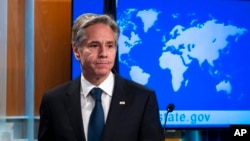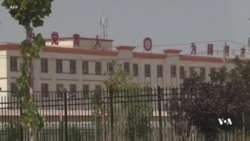U.S. Secretary of State Antony Blinken heads to China Tuesday for several days of talks with senior officials in Shanghai and Beijing.
Blinken’s second trip to China comes as the United States warns it against enabling Russia in Russia’s war on Ukraine, with Chinese firms directly supplying critical components for Russia’s defense industrial base.
Other pressing matters on the agenda include counternarcotics, bolstering military-to-military communication, establishing talks on artificial intelligence risks and safety, and exploring ways to strengthen people-to-people ties, according to the State Department.
A senior State Department official said in a briefing Friday the U.S. is “realistic and clear eyed about the prospects of breakthroughs” on any of the issues on the agenda. Some analysts said they do not anticipate any major advances to emerge from the talks.
China aiding Russia in Ukraine war
In a joint statement last week, foreign ministers from the G7 leading industrialized nations urged China to stop transferring dual-use materials and weapons components that Russia is using to advance its military production.
U.S. officials said those materials include significant quantities of microelectronics, unmanned aerial vehicles, cruise missile technology, and nitrocellulose, which Russia uses to make propellants for weapons
“China can’t have it both ways” — helping Russia and keeping good relations with Europe, Blinken told reporters at a press conference Friday in Capri, Italy.
A senior State Department official told VOA during a virtual briefing Friday that the United States is “prepared to take steps” when necessary, against Chinese firms that “severely undermine security in both Ukraine and Europe.”
The United States may sanction Chinese banks that facilitate the transfer of these materials, according to analysts. Washington has sanctioned Chinese individuals and companies that provide material support to Russia, and is enlisting European allies for similar measures.
"In contrast to the United States, the European Union has not really sanctioned Chinese individuals or companies to the same degree," Kelly Grieco, a senior fellow at the Washington-based Stimson Center, told VOA.
Grieco said the U.S. is working with other G7 members to garner more support from European nations to take similar actions.
Beijing dismissed what Chinese officials labeled as Washington's attempt to “smear” or “attack the normal relations between China and Russia.”
China maintains it regulates the export of dual-use materials to Russia in accordance with laws. The U.S. “should not harm the legitimate rights and interests of China and Chinese companies," Mao Ning, a spokeswoman for China's Foreign Affairs Ministry, said during a recent briefing.
Taiwan
Blinken’s visit to China is scheduled just weeks before the inauguration of Taiwan’s president-elect Lai Ching-te on May 20.
The U.S. is sending an unofficial delegation to attend his inauguration, which includes former Deputy Secretary of State Richard Armitage and Laura Rosenberger, who chairs the American Institute in Taiwan.
Blinken will underscore America's enduring interest in preserving peace and stability in the Taiwan Strait.
“During this important and sensitive time leading up to the May 20 inauguration, all countries will contribute to peace and stability, avoid taking provocative actions that may raise tensions and demonstrate restraint. That will be our message going forward,” the senior State Department official said.
Counternarcotics
China remains the primary source of fentanyl-related substances trafficked through international mail and express consignment operations, serving as the main source for all fentanyl-related substances entering the United States, according to the U.S. Drug Enforcement Administration.
“It's in China's interest to cooperate in reducing and ending the flow of chemical precursors to the United States,” the State Department official said.
He added that the U.S. delegation traveling to China will “get down to detailed implementation” of the agreement reached in November 2023 to restart cooperation, particularly focusing on “concrete progress” between the law enforcement agencies of the two countries to curb the flow of these chemical precursors.
Some analysts said the extent and durability of the cooperation is yet to be seen.
“China sees counternarcotics and more broadly international law enforcement cooperation as strategic tools that it can leverage to achieve other objectives,” wrote Vanda Felbab-Brown, a senior fellow with the Brookings Institution.
“Even though China’s current goal is to reduce tensions, China’s drug cooperation is vulnerable to new crises in the bilateral relationship,” she added.
Blinken’s visit to China is the latest in a flurry of high-level diplomacy aimed at stabilizing China-U.S. relations. It follows Treasury Secretary Janet Yellen’s recent trip to Guangzhou, White House national security adviser Jake Sullivan’s meeting with Chinese Foreign Minister Wang Yi in Munich in February, and U.S. President Joe Biden’s talks with Chinese President Xi Jinping in Woodside, California, in November.







